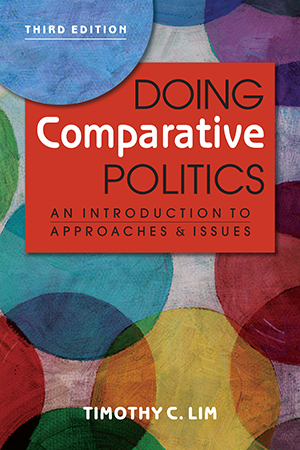
- 2016/409 pages
Doing Comparative Politics:
An Introduction to Approaches and Issues, 3rd edition
Paperback: $35.00
ISBN: 978-1-62637-450-8
Ebook: $32.50
ISBN: 978-1-62637-618-2
This systematic, user friendly, and refreshingly unusual introduction to comparative politics has not only been updated and refined in the third edition, but also fully revised to reflect the impact of major new developments in world politics.
Designed to teach students how to think comparatively and theoretically about the world they live in, the book is organized around a set of critical questions—why are poor countries poor? why is East Asia relatively prosperous? what makes a democracy? how can we explain terrorism and genocide? what leads people to mobilize around a cause?—each the topic of a full chapter. These issue chapters are based on the solid methodological and theoretical foundation laid out in the first part of the book, and the entire text is enhanced with case studies and graphics.
Designed to teach students how to think comparatively and theoretically about the world they live in, the book is organized around a set of critical questions—why are poor countries poor? why is East Asia relatively prosperous? what makes a democracy? how can we explain terrorism and genocide? what leads people to mobilize around a cause?—each the topic of a full chapter. These issue chapters are based on the solid methodological and theoretical foundation laid out in the first part of the book, and the entire text is enhanced with case studies and graphics.
No rights in India.





